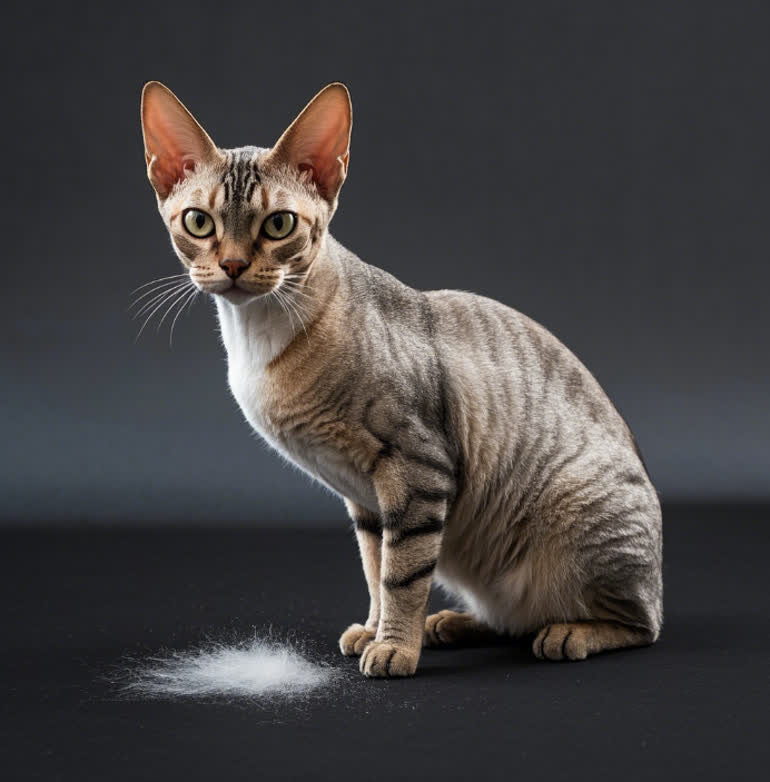Understanding the Devon Rex Coat
Common Causes of Hair Loss in Devon Rex Cats
1. Genetic Predispositions
Hypotrichosis: This hereditary condition affects Devon Rex cats, causing patchy hair loss and thin skin. Kittens may be born with bald spots or develop them shortly after birth .
Alopecia: Stress during kittenhood (e.g., rehoming or environmental changes) can trigger temporary hair loss, particularly around the neck .
2. Nutritional Deficiencies
Protein: Essential for hair growth. Ensure their diet includes high-quality animal protein sources like chicken or fish .
Omega-3 Fatty Acids: Found in fish oil, these reduce inflammation and promote a shiny coat .
Vitamins A and E: Support skin health and prevent dryness .
3. Parasites and Skin Infections
Fleas and Ticks: These parasites cause itching, leading to excessive scratching and hair loss .
Ringworm (Fungal Infection): Common in kittens, ringworm causes circular bald patches and scaly skin .
Mites: Ear mites or mange mites irritate the skin, prompting self-grooming that damages fur .
4. Stress and Anxiety
Moving homes
Introducing new pets or family members
Loud noises
Separation anxiety
can trigger excessive grooming or fur pulling .
5. Hormonal Imbalances
6. Environmental Factors
Seasonal Shedding: Devon Rex cats typically shed more in spring and fall due to temperature changes .
Central Heating: Dry indoor air can dehydrate the skin, causing hair to break easily .
Allergies: Dust, pollen, or certain foods may cause skin irritation and hair loss .
Diagnosing the Cause of Hair Loss
Consult a Veterinarian: A vet will perform a physical exam, skin scrapings, or blood tests to rule out infections, allergies, or hormonal issues .
Monitor Behavior: Note changes in appetite, energy levels, or grooming habits. Excessive scratching may indicate parasites or allergies .
Check Diet: Ensure your cat’s food meets AAFCO standards and includes essential nutrients .
Effective Solutions for Hair Loss
1. Nutritional Adjustments
High-Quality Diet: Opt for cat food rich in omega-3s and protein. Brands like Royal Canin’s Devon Rex formula are tailored to their needs .
Supplements: Add fish oil or biotin to support hair growth .
2. Grooming Practices
Regular Brushing: Use a soft brush or grooming mitt to remove loose hair and distribute natural oils. Brush 2-3 times weekly to prevent matting .
Gentle Bathing: Bathe your cat monthly with a hypoallergenic shampoo to reduce dander and soothe the skin .
3. Parasite Control
Topical Treatments: Apply flea and tick preventives like Frontline or Advantage monthly .
Environmental Cleaning: Vacuum frequently and wash bedding to eliminate parasite eggs .
4. Stress Management
Create a Calm Environment: Provide hiding spots, toys, and consistent routines. Use pheromone diffusers like Feliway to reduce anxiety .
Interactive Play: Engage your cat daily to alleviate boredom and stress .
5. Veterinary Care
Medications: For infections, vets may prescribe antifungal creams or antibiotics. Steroids or antihistamines can treat allergies .
Hormone Therapy: If hormonal imbalances are detected, medications or dietary changes may be recommended .
Preventive Care Tips
Regular Checkups: Schedule annual vet visits to catch issues early.
Hydration: Ensure access to fresh water to maintain skin health.
Avoid Harsh Products: Use cat-specific grooming tools and shampoos to prevent skin irritation .
When to Seek Urgent Help
Bald patches with redness or scabs
Excessive scratching or biting at the skin
Weight loss or lethargy
Changes in appetite or litter box habits










